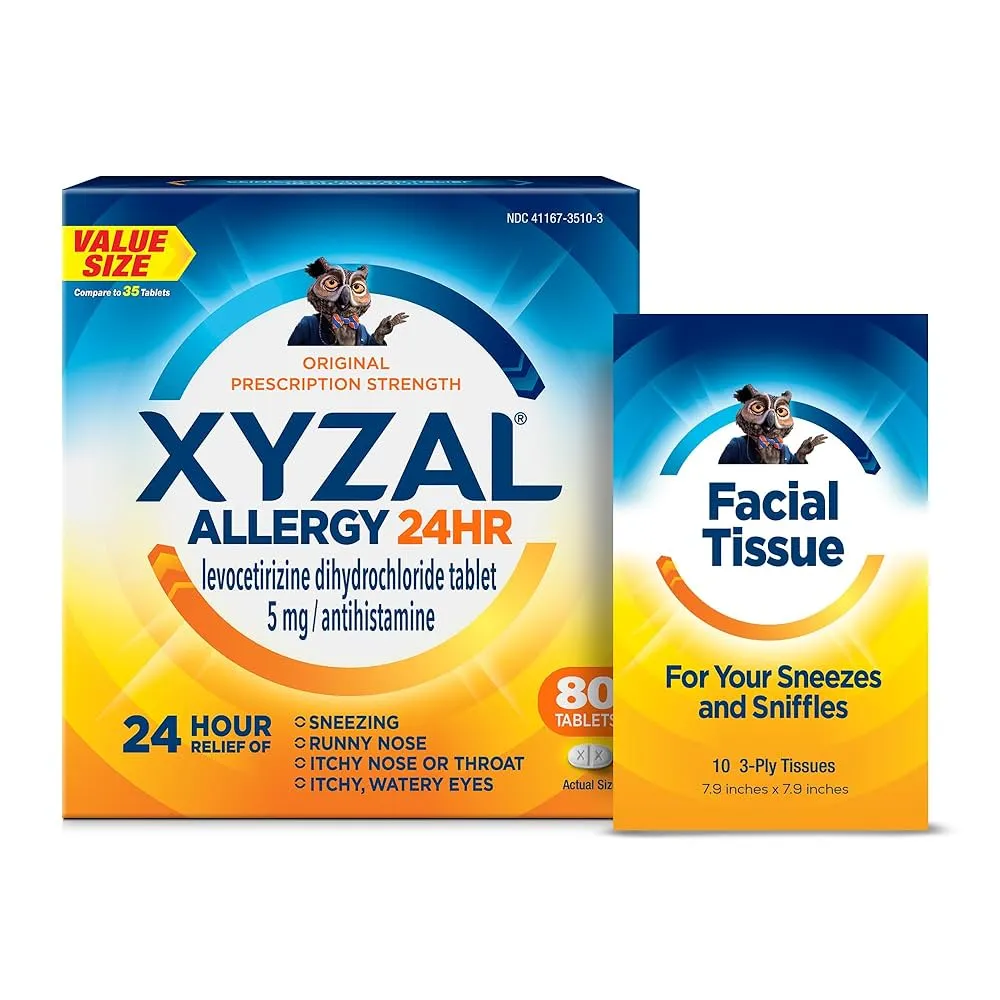Comprehensive Guide to Levocetirizine: Uses, Dosage, Side Effects, and More
What is Levocetirizine?
Overview of Levocetirizine
Generic Name: Levocetirizine
Brand Name: Xyzal, generics
Drug Group: Antihistamine (H1 receptor antagonist)
Commonly Used For
- Treat seasonal allergic rhinitis.
- Manage chronic urticaria.
- Relieve perennial allergic rhinitis.
Key Characteristics
Form: Oral tablets (5 mg), oral solution (2.5 mg/5 mL) (detailed in Dosage section).
Mechanism: Selectively inhibits H1 receptors with minimal sedative effects compared to first-generation antihistamines.
Approval: FDA-approved (2007 for Xyzal) and EMA-approved for allergic rhinitis and urticaria.

Indications and Uses of Levocetirizine
Levocetirizine is indicated for a variety of allergic and inflammatory conditions, leveraging its potent H1 receptor blockade:
Seasonal Allergic Rhinitis: Alleviates symptoms like sneezing, nasal congestion, and itchy eyes caused by pollen, per allergy guidelines, supported by clinical trials showing 70% symptom reduction within 1 hour.
Perennial Allergic Rhinitis: Manages year-round symptoms due to dust mites or pet dander, improving quality of life, recommended in immunology protocols.
Chronic Idiopathic Urticaria: Reduces hives and itching, decreasing lesion frequency, with dermatology evidence.
Allergic Conjunctivitis: Investigated off-label to relieve ocular itching and redness, with ophthalmology-allergy studies.
Atopic Dermatitis: Explored off-label to control pruritus in mild cases, with pediatric dermatology data.
Mild Asthma with Allergic Trigger: Used off-label as an adjunct to reduce allergen-induced bronchospasm, with pulmonology research.
Eosinophilic Esophagitis: Managed off-label to alleviate allergic inflammation in the esophagus, with gastroenterology evidence.
Contact Dermatitis: Initiated off-label to reduce allergic skin reactions, with occupational health studies.
Food Allergy Symptoms: Investigated off-label to mitigate mild systemic allergic responses, with allergy-immunology data.
Exercise-Induced Anaphylaxis: Applied off-label to prevent histamine release during physical activity, with sports medicine research.
Dosage of Levocetirizine
Dosage for Adults and Adolescents (≥12 years)
Seasonal or Perennial Allergic Rhinitis: 5 mg once daily in the evening, with or without food.
Chronic Urticaria: 5 mg once daily, adjusted based on symptom control, for up to 6 weeks.
Dosage for Children
6–11 years: 2.5 mg (2.5 mL oral solution) once daily in the evening, under pediatric supervision.
2–5 years: 1.25 mg (1.25 mL oral solution) once daily, increased to 2.5 mg if tolerated, with monitoring.
<2 years: Not recommended due to limited safety data.
Dosage for Pregnant Women
Pregnancy Category B: Use only if benefits outweigh risks; consult an obstetrician, with fetal monitoring.
Dosage Adjustments
Renal Impairment:
- Mild (CrCl 50–80 mL/min): 5 mg once every other day.
- Moderate (CrCl 30–50 mL/min): 5 mg every 2 days.
- Severe (CrCl <30 mL/min): 5 mg every 3 days or avoid.
Hepatic Impairment: Mild to moderate (Child-Pugh A or B): No adjustment; severe (Child-Pugh C): Use cautiously.
Concomitant Medications: Adjust if combined with CNS depressants (e.g., alcohol); monitor for sedation.
Elderly: Start with 2.5 mg daily; assess renal function and sedation risk.
Additional Considerations
- Take this active ingredient with water, with or without food, preferably in the evening to minimize drowsiness.
- Use a calibrated syringe for oral solution dosing in children.
- Avoid abrupt cessation in chronic urticaria to prevent symptom rebound.
How to Use Levocetirizine
Administration:
- Oral Tablet: Swallow whole with a glass of water, taken once daily.
- Oral Solution: Measure with a provided syringe or spoon, administer directly or mix with a small amount of water.
Timing: Take in the evening to align with peak symptom times and reduce daytime drowsiness.
Monitoring: Watch for excessive sleepiness, dry mouth, or signs of allergic reaction (e.g., rash); report changes immediately.
Additional Tips:
- Store at 20–25°C (68–77°F), protecting from moisture and light.
- Keep out of reach of children due to overdose risk.
- Avoid driving or operating machinery if drowsiness occurs; consult a provider if persistent.
- Use with a consistent routine to enhance adherence; pair with a meal if gastrointestinal upset occurs.
- Schedule follow-ups every 2–4 weeks to assess efficacy and adjust dose if needed.
Contraindications for Levocetirizine
Hypersensitivity: Patients with a known allergy to Levocetirizine, cetirizine, or hydroxyzine.
Severe Renal Impairment: Contraindicated in CrCl <10 mL/min due to accumulation risk.
End-Stage Renal Disease (ESRD): Avoid in patients on dialysis unless benefits outweigh risks.
Children <2 years: Contraindicated due to insufficient safety data.
Acute Porphyria: Avoid due to potential exacerbation of porphyric crises.
Side Effects of Levocetirizine
Common Side Effects
- Drowsiness (5–10%, managed by evening dosing)
- Dry Mouth (3–7%, relieved with hydration)
- Fatigue (2–6%, decreases with time)
- Headache (2–5%, managed with rest)
- Nasal Congestion (1–4%, transient)
These effects may subside with adaptation.
Serious Side Effects
Seek immediate medical attention for:
- Neurological: Seizures or severe sedation.
- Cardiac: Prolonged QT interval or arrhythmias (rare).
- Allergic: Anaphylaxis, angioedema, or rash.
- Hepatic: Jaundice or liver dysfunction (rare).
- Psychiatric: Hallucinations or agitation (rare).
Additional Notes
- Regular monitoring for sedation and renal function is advised, especially in elderly patients.
- Patients with a history of seizures should be closely watched, with EEG considered if symptoms arise.
- Report any unusual symptoms (e.g., difficulty breathing, rapid heartbeat) immediately to a healthcare provider.
- Long-term use (>6 months) requires periodic liver function tests and assessment of CNS effects.
Warnings & Precautions for Levocetirizine
General Warnings
Sedation: Risk of drowsiness, though less than first-generation antihistamines; avoid alcohol or sedatives.
Renal Function Decline: Risk of accumulation in renal impairment; monitor CrCl regularly.
Seizure Risk: Rare exacerbation in predisposed patients; use cautiously.
Anticholinergic Effects: Mild dry mouth or urinary retention; monitor in elderly.
Allergic Reactions: Risk of hypersensitivity; discontinue if severe.
Additional Warnings
Prolonged QT Interval: Rare risk; monitor ECG in patients with cardiac history.
Hepatic Effects: Mild elevation of liver enzymes; assess in chronic use.
Pediatric Overdose: Risk of agitation or sedation in children; use lowest effective dose.
Immune Suppression: Theoretical risk with long-term use; monitor for infections.
Hypersensitivity Reactions: Rare anaphylaxis; stop if swelling or difficulty breathing occurs.
Use in Specific Populations
- Pregnancy: Category B; use with caution and monitoring.
- Breastfeeding: Use caution; monitor infant for sedation from potential milk transfer.
- Elderly: Higher risk of sedation and renal decline; start with reduced dose.
- Children: Safe for ages 2+ with supervision.
- Renal/Hepatic Impairment: Adjust or avoid based on severity.
Additional Precautions
- Inform your doctor about kidney disease, epilepsy, or sedative use before starting this medication.
- Avoid concurrent use with alcohol to minimize CNS depression.
- Use protective measures (e.g., sunglasses) if photophobia develops.
Overdose and Management of Levocetirizine
Overdose Symptoms
- Drowsiness, agitation, or dry mouth.
- Severe cases: Confusion, tachycardia, or seizures.
- Restlessness, tremor, or urinary retention as early signs.
- Coma or respiratory depression with extremely high doses.
Immediate Actions
Contact the Medical Team: Seek immediate medical help if overdose is suspected.
Supportive Care: Monitor vital signs, provide IV fluids, and manage seizures with benzodiazepines if needed.
Specific Treatment: No specific antidote; use activated charcoal if ingestion is recent (within 1 hour).
Monitor: Check ECG, renal function, and neurological status for 24–48 hours.
Patient Education: Advise against exceeding prescribed doses and to store safely.
Additional Notes
- Overdose risk is low with therapeutic use; educate on proper dosing.
- Report persistent symptoms (e.g., severe drowsiness, irregular heartbeat) promptly.
Drug Interactions with Levocetirizine
This active ingredient may interact with:
- CNS Depressants: Increases sedation (e.g., benzodiazepines, alcohol); avoid combination.
- Ritonavir: Raises levels via CYP3A4 inhibition; monitor for toxicity.
- Theophylline: May reduce efficacy; separate administration by 2 hours.
- Anticholinergics: Enhances dry mouth or urinary retention; use cautiously.
- MAOIs: Theoretical risk of serotonin syndrome; monitor.
Action: Provide your healthcare provider with a complete list of medications.
Patient Education or Lifestyle
Medication Adherence: Take this antihistamine as prescribed for allergies, following the daily schedule.
Monitoring: Report drowsiness, dry mouth, or signs of allergic reaction immediately.
Lifestyle: Avoid alcohol; use sunglasses if photophobia occurs.
Diet: No specific restrictions; take with water.
Emergency Awareness: Know signs of overdose or severe reaction; seek care if present.
Follow-Up: Schedule regular check-ups every 4–6 weeks to assess efficacy and side effects.
Pharmacokinetics of Levocetirizine
- Absorption: Oral, peak at 0.9–1.2 hours; bioavailability ~100%.
- Distribution: Volume of distribution ~0.4 L/kg; 91–92% protein-bound.
- Metabolism: Minimal hepatic metabolism via aromatic oxidation.
- Excretion: Primarily renal (85–90% unchanged); half-life 7–10 hours.
- Half-Life: 7–10 hours, prolonged in renal impairment.
Pharmacodynamics of Levocetirizine
This drug exerts its effects by:
- Blocking H1 receptors, inhibiting histamine-induced allergic responses.
- Reducing symptoms of rhinitis and urticaria within 1 hour of dosing.
- Exhibiting dose-dependent risks of sedation and anticholinergic effects.
Storage of Levocetirizine
Temperature: Store at 20–25°C (68–77°F); protect from moisture and light.
Protection: Keep in original container, away from heat and humidity.
Safety: Store in a secure location out of reach of children due to overdose potential.
Disposal: Dispose of unused tablets or solution per local regulations or consult a pharmacist.
Frequently Asked Questions (FAQs)
Q: What does Levocetirizine treat?
A: This medication treats allergies and hives.
Q: Can this active ingredient cause drowsiness?
A: Yes, drowsiness is possible; avoid driving if affected.
Q: Is Levocetirizine safe for children?
A: Yes, for ages 2+ with supervision.
Q: How is this drug taken?
A: Orally as tablets or solution, once daily.
Q: How long is Levocetirizine treatment?
A: Typically 1–6 weeks, or as prescribed.
Q: Can I use Levocetirizine if pregnant?
A: Yes, with caution; consult a doctor.
Regulatory Information
This medication is approved by:
U.S. Food and Drug Administration (FDA): Approved in 2007 (Xyzal) for allergic rhinitis and urticaria.
European Medicines Agency (EMA): Approved for seasonal and perennial allergic rhinitis.
Other Agencies: Approved globally for allergy management; consult local guidelines.
References
- U.S. Food and Drug Administration (FDA). (2023). Xyzal (Levocetirizine) Prescribing Information.
- Official FDA documentation detailing the drug’s approved uses, dosage, and safety.
- European Medicines Agency (EMA). (2023). Levocetirizine Summary of Product Characteristics.
- EMA’s comprehensive information on the medication’s indications and precautions in Europe.
- National Institutes of Health (NIH). (2023). Levocetirizine: MedlinePlus Drug Information.
- NIH resource providing detailed information on the drug’s uses, side effects, and precautions.
- World Health Organization (WHO). (2023). WHO Model List of Essential Medicines: Levocetirizine.
- WHO’s consideration of Levocetirizine for allergic conditions.
- Journal of Allergy and Clinical Immunology. (2022). Levocetirizine in Allergic Rhinitis.
- Peer-reviewed article on Levocetirizine efficacy (note: access may require a subscription).
